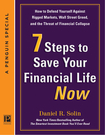
If you want to make a New Year's resolution that will put money in your pocket, here's my suggestion: Don't rely on the advice of Jim Cramer or his colleagues in the securities industry who tell you they have the ability to pick stock winners.
In his excellent book, Think, Act ,and Invest Like Warren Buffett, Larry Swedroe summarizes data indicating that individual investors achieve poor returns. This data shows individual investors who rely on brokers and others who claim to be able to "beat the markets" underperform market returns that are theirs for the taking. The only winners are the brokers who "advise" them and the advertisers on shows like Cramer's, who do their best to convince you they have an expertise that doesn't exist.
Since Cramer appeals mainly to high-testosterone men, it seems logical to inquire about the investing prowess of this demographic. One study showed that men trade more and have lower returns than women. The underperformance was more pronounced when comparing single men and single women.
The authors concluded that overconfident investors place too much confidence in the information they are getting and overestimate their expected gains on trading. There appears to be an inverse relationship between the amount of confidence and returns. The more confident you are, the worse your returns. Maybe that's why Cramer always seems so confident of his advice.
Since women outperformed men, how did they do against market and risk-adjusted benchmarks? The same study demonstrated they underperformed.
Maybe you watch shows like Mad Money with members of your investment club. Too bad. Another study of 166 investment clubs showed the average investment club underperformed a broad-based market index by more than 3 percent per year for the period examined.
Perhaps you're thinking this data applies only to investors of "average" intelligence, which (obviously!) excludes you. According to Swedroe, a study of the performance of investment returns earned by the Mensa Investment Club between 1986 and 2001 showed returns of 2.5 percent per year. During the same period, the S&P 500 Index earned 15.3 percent. To qualify for admission to Mensa, applicants must demonstrate intelligence test scores in the top 2 percent of the population.
Rather than succumbing to Cramer's theatrics or the entreaties of your broker, focus on your asset allocation. Limit your investments to a globally diversified portfolio of low management fee index funds. It's within your power to make 2013 a better year financially for you and your loved ones.

